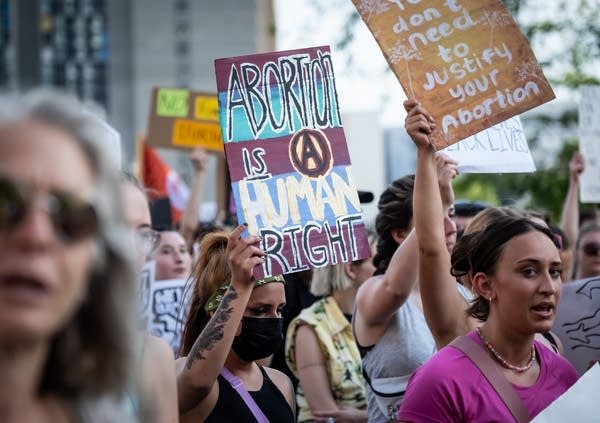New bill would codify abortion rights into Minnesota law

Go Deeper.
Create an account or log in to save stories.
Like this?
Thanks for liking this story! We have added it to a list of your favorite stories.
The House just wrapped up its first hearing on a bill to codify abortion rights into Minnesota law. Representative Carlie Kotyza-Witthuhn, the bills sponsor, shares the details.
Use the audio player above to listen to the full conversation.
Subscribe to the Minnesota Now podcast on Apple Podcasts, Google Podcasts, Spotify or wherever you get your podcasts.
We attempt to make transcripts for Minnesota Now available the next business day after a broadcast. When ready they will appear here.
Turn Up Your Support
MPR News helps you turn down the noise and build shared understanding. Turn up your support for this public resource and keep trusted journalism accessible to all.
Audio transcript
CARLIE KOTYZA-WITTHUHN: Hi, Cathy. Thanks for having me.
CATHY WURZER: I understand that the bill passed out of committee, what, 11 to eight today?
CARLIE KOTYZA-WITTHUHN: Yes, that's correct.
CATHY WURZER: What was the hearing like?
CARLIE KOTYZA-WITTHUHN: Well, the ultimate vote was on party lines. We had a few amendments that we talked through. And again, declined those amendments on party lines, unfortunately. We know that the majority of Minnesotans are with us on this. And when I say us, I mean the house DFL, the Senate DFL, the governor. They put this very front and center in this last election. And we know that they want us to move urgently on this.
So House File 1, first hearing of the First Health Committee this year, and we're going to keep moving through the process.
CATHY WURZER: So the US Supreme Court left the question of whether abortion is legal up to the states. And abortion is already legal in Minnesota, as you know. Talk about the need that DFLers see to cement the rights in law.
CARLIE KOTYZA-WITTHUHN: Yeah, so that's correct. The reproductive rights currently in Minnesota hang in the balance, just like our federal reproductive rights did through Roe v. Wade. And when the Supreme Court overturned Roe v. Wade, kicked the decision back to the states. We have a similar state case called Doe v. Gomez that currently protects reproductive rights and health care access.
But the same thing that happened to Roe could happen here in Minnesota should a future Supreme Court want to just renege on that decision.
CATHY WURZER: I just--
CARLIE KOTYZA-WITTHUHN: --really important to-- sorry, to put this into state statute. And as an additional layer of protection.
CATHY WURZER: OK, let's talk about the potential state statute here. I was reading through the bill. It's pretty short one. What will it actually do?
CARLIE KOTYZA-WITTHUHN: So what the bill does is puts into state law that women and Minnesotans have the fundamental right to make individual decisions about reproductive health care. We define reproductive health care then in statute, which-- so in the first subdivision two definition, that can mean anything from contraception, sterilization, maternity care, including abortion care, family planning and fertility services, and then counseling regarding reproductive health care.
So I think that really putting that framework in state statute helps people understand what reproductive health care means. And ultimately, it prevents us politicians from interfering with a person's individual right to make those health care decisions.
CATHY WURZER: Help us out here. If this passes and becomes law, laws can be amended or repealed in years to come, you know that. And you did mention and it's true that in '95, the state Supreme Court ruled that Minnesota's state Constitution protects abortion rights. But would there be plans to enshrine abortion rights in the state Constitution via constitutional amendment that would go to voters? Anything to talk about around that?
CARLIE KOTYZA-WITTHUHN: I think conversations surrounding a potential constitutional amendment are in process. I can't speak specifically on that. I haven't been involved in many of those conversations. But I know, I mean, just looking across the United States, I mean, we saw in Kansas, almost immediately after Roe v. Wade, folks came to the polls to defeat a constitutional amendment that would have disallowed abortion in Kansas.
And so it's something certainly that's on people's minds, because we've seen it happen in other places across the country. And I think we're really focused on getting this into statute as, again, an additional layer of protection. But yes, certainly allowing the voters to have the ultimate decision at some point down the road is a possibility.
CATHY WURZER: So this is House File 1. It's already passed the first committee test. Will the Senate move on its abortion rights bill?
CARLIE KOTYZA-WITTHUHN: I believe the Pro Act in the Senate is going to be having a hearing next week in their health committee. I don't have all the details surrounding that. But I know that they are working to parallel process on this. And we hope to get it signed into law as soon as possible. It does go into effect immediately after it's signed.
CATHY WURZER: What's the next committee hurdle for your bill, House File 1?
CARLIE KOTYZA-WITTHUHN: We will be moving to the Judiciary Committee and looking to have the bill hopefully heard on Monday-- or excuse me, on Tuesday in judiciary. And then we will have a conversation in state government and local government as well.
CATHY WURZER: All right. So as you say, it's on the fast track. Representative, I appreciate your time. Thank you so much.
CARLIE KOTYZA-WITTHUHN: Absolutely. I appreciate it, Cathy. Have a wonderful day.
CATHY WURZER: You, too. That's Representative Carlie Kotyza-Witthuhn.
Download transcript (PDF)
Transcription services provided by 3Play Media.


